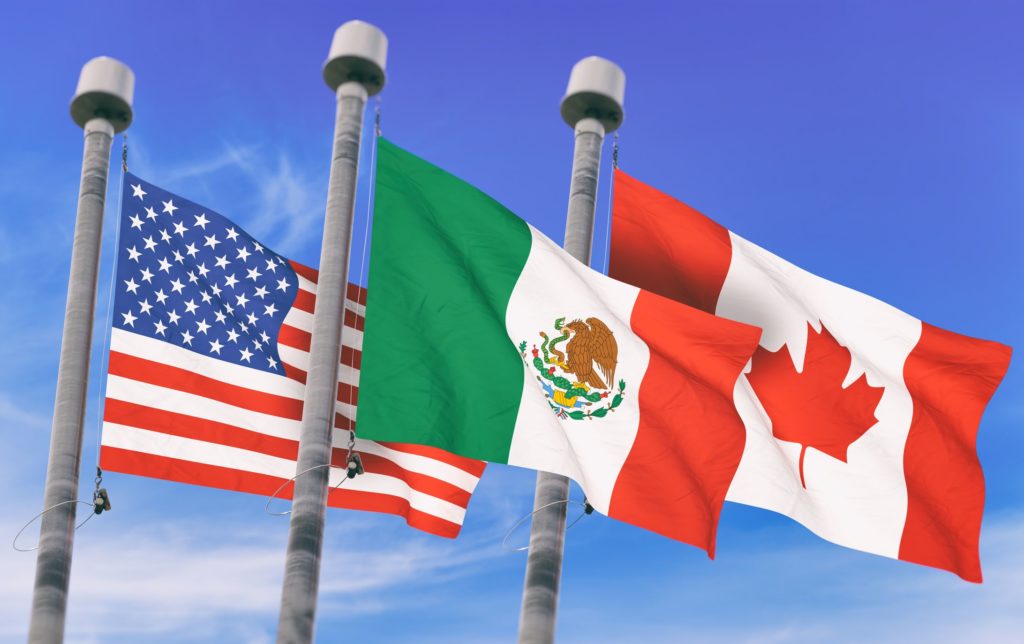 According to a Washington Post report, NAFTA negotiations could stretch into 2019. President Trump has called for renegotiations of the North American Free Trade Agreement (NAFTA) since his first day in office, and has even called for a border tax and exit from the treaty.
According to a Washington Post report, NAFTA negotiations could stretch into 2019. President Trump has called for renegotiations of the North American Free Trade Agreement (NAFTA) since his first day in office, and has even called for a border tax and exit from the treaty.
While most economists believe such drastic measures aren’t likely, there could be a bumpy road ahead with “tit-for-tat” tariffs that could impact both foreign and domestic manufacturers.
On January 23, Trump issued trade tariffs on imported solar panels and washing machines. The tax on washing machines will start at 20 percent for the first 1.2 million imported machines and 50 percent for machines after that. The idea is that by making foreign machines more expensive to import it will make American-made machines more attractive. Whirlpool, the largest U.S. manufacturer of machines, should face less competition. Credit Suisse analyst Susan Maklari wrote in a note to clients that “all those producing in the U.S. will now create a more level playing field.”
But Samsung, one of the top exporters of washing machines, has recently moved some production to the United States, including a new facility in South Carolina with 600 jobs. The company noted that [NAFTA] may impact jobs at its U.S. facilities and that “everyone will pay more, with fewer choices.”
“Without NAFTA, large segments of the U.S. automotive industry would have moved to other low-wage countries in Asia, Europe or South America.”
The U.S. manufacturing industry has had mixed feelings on NAFTA. While smaller manufacturers have seen some business head south, larger ones note that their supply chains and operations are heavily dependent on sourcing and labor in Mexico.
A study released last year by the Center for Automotive Research found NAFTA positively impacted the U.S. auto industry. It said that “continent-wide” reduction or elimination of tariffs has allowed manufacturers and suppliers to optimize cost and efficiencies by locating assembling operations and manufacturing in the best cost locations. “Without NAFTA, large segments of the U.S. automotive industry would have moved to other low-wage countries in Asia, Europe or South America,” CAR said.
Jobs at risk
An economic analysis for the Business Roundtable prepared by Trade Partnerships Worldwide found that the termination of NAFTA would result in the loss of nearly 1.8 million U.S. jobs in their first year. The analysis showed that it would reduce U.S. exports to Canada and Mexico and make American companies less competitive in the global market due to higher tariffs. “Terminating NAFTA would permanently reduce U.S. employment, exports and economic output, while benefiting our economic competitors at the expense of American workers and businesses,” said Joshua Bolten, President and CEO of the Business
Roundtable.
EY also noted that such trade policies could also cancel out the benefits of tax reform, and that tightening trade deals could reduce incentives for companies to invest in the U.S.
Until negotiations are finalized, new tariffs could be on the horizon. Matthew Rooney, director of economic growth at the Bush Institute in Texas, told CNN that Mexico could retaliate with a tit-for-tat response that could also impact other areas of the U.S. economy, including agriculture. Rooney said Mexico is in a “good position” to retaliate without having to impose cost increases on its citizens. “Most of the downsides of these policies won’t be felt immediately…the political price will come in 2019 and beyond,” Rooney said.

Chief Executive Group exists to improve the performance of U.S. CEOs, senior executives and public-company directors, helping you grow your companies, build your communities and strengthen society. Learn more at chiefexecutivegroup.com.
0

1:00 - 5:00 pm
Over 70% of Executives Surveyed Agree: Many Strategic Planning Efforts Lack Systematic Approach Tips for Enhancing Your Strategic Planning Process
Executives expressed frustration with their current strategic planning process. Issues include:
Steve Rutan and Denise Harrison have put together an afternoon workshop that will provide the tools you need to address these concerns. They have worked with hundreds of executives to develop a systematic approach that will enable your team to make better decisions during strategic planning. Steve and Denise will walk you through exercises for prioritizing your lists and steps that will reset and reinvigorate your process. This will be a hands-on workshop that will enable you to think about your business as you use the tools that are being presented. If you are ready for a Strategic Planning tune-up, select this workshop in your registration form. The additional fee of $695 will be added to your total.

2:00 - 5:00 pm
Female leaders face the same issues all leaders do, but they often face additional challenges too. In this peer session, we will facilitate a discussion of best practices and how to overcome common barriers to help women leaders be more effective within and outside their organizations.
Limited space available.

10:30 - 5:00 pm
General’s Retreat at Hermitage Golf Course
Sponsored by UBS
General’s Retreat, built in 1986 with architect Gary Roger Baird, has been voted the “Best Golf Course in Nashville” and is a “must play” when visiting the Nashville, Tennessee area. With the beautiful setting along the Cumberland River, golfers of all capabilities will thoroughly enjoy the golf, scenery and hospitality.
The golf outing fee includes transportation to and from the hotel, greens/cart fees, use of practice facilities, and boxed lunch. The bus will leave the hotel at 10:30 am for a noon shotgun start and return to the hotel after the cocktail reception following the completion of the round.